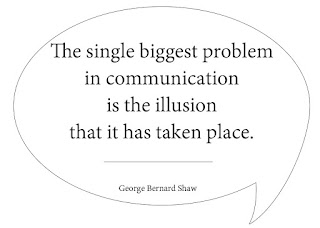This quote speaks volumes to me, "Without communication, there is no relationship. Without respect, there is no love. Without trust, there is no reason to continue." Communication is the starting point to all relationships, especially those with the parents of children that we serve every day in the classroom as teachers. Communication is an art and also a journey. It's never easy, but the investment of time is well worth the effort. Today, I would like to illustrate why communication is important for teachers to master, and steps that can be taken to become effective communicators.
What is the downside of ineffective classroom communication?
Parents love information. They want to know they have partners in their children's education. Lack of communication creates confusion, abandonment, and feelings of vulnerability on the part of the parents. This leads to a lack of respect between parents and teachers, which eventually erodes trust. Eventually, the lack of trust propels parents to reach for help outside of the classroom such as going directly to administration, the school board, or other teachers and parents for help. At this point, the relationship is at the breaking point. School life is difficult and burdensome.
What is the upside of effective classroom communication?
Parents love your classroom! They spread the word to other parents and the administration of the wonderful things happening every day. Parents will volunteer to come in and help tutor, work with special projects, or even co-lead events with you. They will listen during conferences, knowing you have their child's best interest at heart. School life is uplifting and inspiring.
As a teacher, which scenario would you choose?
Both situations may be led by highly competent teachers who strive to do the very best for their students. The problem lies in that one decided not to invest the time in parent relationships and communication, while the other did. This is the defining difference--time and commitment. Relationships and the communication needed to develop them takes time, and to get the highly rewarding results, teachers must be willing to invest the time into it. However, one of the largest factors is also consistency. Finding consistent methods of communicating, and then marketing those methods to ensure parents are informed.
Steps to Effective Parent Communication!
Please be warned that I use several strategies, because that is what it takes. Why? Because 100% of parents will never have all of these technologies at the same time. To ensure continuity, you must have a few different strategies.
- Daily Shout--Out:
- Remind 101 is a great way to send a daily text and reminders to parents.
- Group E-mail: I send a daily e-mail to all parents with homework and assignments attached. Get the e-mails of parents at the beginning of the year, and set up a group mailing.
- Twitter: Many school systems prefer Twitter as a social media source due to the nature of it's design. It is designed as a newsfeed. Therefore, it's great for sending out quick updates on the happenings of the classroom. This can be done during the day. My previous parents, especially younger ones, loved my Twitter updates and pictures of the happenings in the classroom.
- Design a weekly newsletter with what is coming up. This can be digital or hard copy. In today's world though, digital seems more effective. Students often lose the hard copies. Therefore, a digital copy can be e-mailed, tweeted, texted, or placed on your teacher website, or edmodo page. This year I'm going to use the website https://www.smore.com/ to create my weekly digital flyers.
- Website: If your school offers you a teacher website, it would be a great idea to keep it updated. It is more effective not to have a website, then to have one that has outdated or no information on it. That will only cause stress and irritation with parents. However, a website can be an excellent resource for sustained communication for the year. It can hold resources, monthly calendars, classroom syllabus, and updates.
- School Newsletters: Most schools create a monthly newsletter. Make sure to review them carefully, and remind parents on a weekly or daily basis of upcoming events.
- Send a postcard to all upcoming students before the school year begins. Introduce yourself, and highlight some important events in the coming year.
- Call or e-mail parents when things are great! Call and send e-mails for no reason other than to praise a student for doing something great or for just having such fantastic parents!
- Call when things go bad. This can be uncomfortable, but it must be done! If anything goes awry call the parents--don't e-mail in these cases.
- Get business cards. This past year I created business cards, and passed them out any chance that I got. It had the school information as well as my e-mail address and twitter handle. Go to http://www.vistaprint.com/ to create. I did not spend more than $10, and had more than enough for the school year.
- Get Feedback: Send out a monthly or bimonthly survey using websites like https://www.surveymonkey.com/ to parents and get their input. Make adjustments where necessary.
Finally, sit back and relax. Meditate and think what it's like to be a parent. What kind of communication would you want from your child's teacher? Brainstorm the answers that come to your mind, create a plan, and stay consistent.
Consistency is the key that unlocks it all. Parents, like our students, desire predictability. If you need help, ask a parent volunteer to help you.
Effective communication does require effort, but the rewards are wonderful. Happy parents make for happy teachers, which in turn creates happy students. All of this equates to a highly rewarding year for all.




